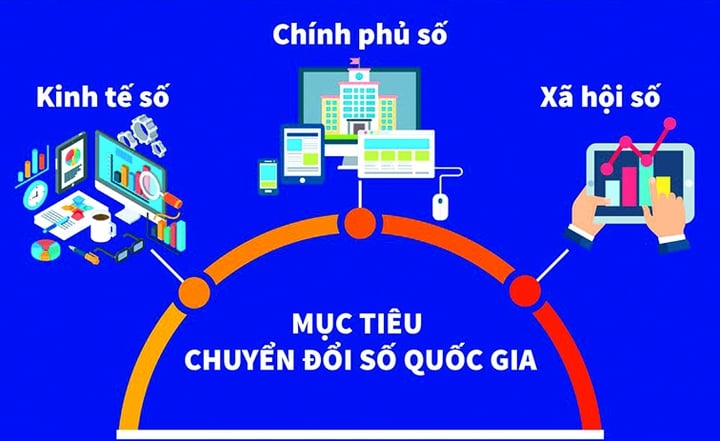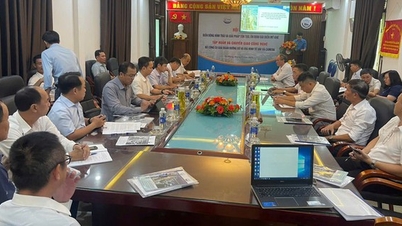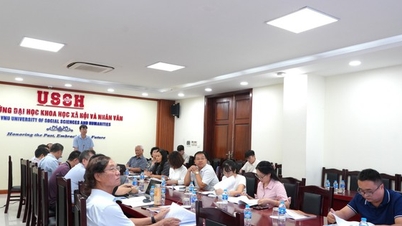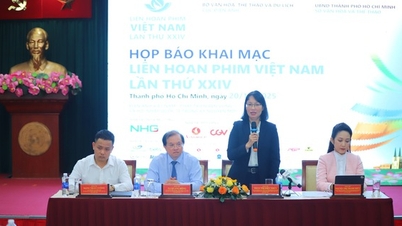
Digital economy is one of the important goals that helps Digital Transformation solve social problems for a better life for people.
Digital economic growth continues to maintain momentum
The end of 2025 will witness a clear mark of the digital economy. In October 2025, the total revenue of the digital technology industry reached VND 505,518 billion, an increase of 52.4% over the same period in 2024. This is an outstanding growth rate in the context of the world facing many economic fluctuations, affirming the competitiveness of Vietnamese enterprises and the ability to take advantage of opportunities from digital transformation.
Accumulated by the end of October 2025, industry revenue reached 4,255 trillion VND, making an important contribution to GDP growth and creating a foundation for Vietnam to move towards the goal of digital economy accounting for 30% of GDP by 2030.
In addition, hardware and electronic products continue to maintain their leading position in export turnover. In October 2025 alone, the turnover reached 17.3 billion USD, an increase of 45.3% over the same period last year. The cumulative 10 months reached 146.5 billion USD, equivalent to 90% of the 2025 plan. These figures show that Vietnam is an attractive destination for the global technology supply chain, while affirming the role of technological innovation in sustainable economic development.
The technology business ecosystem continues to expand. By the end of September 2025, the country had 78,502 digital enterprises, a rapid increase over the same period. This is the core force in developing the digital economy, creating high-quality jobs and contributing to the production of Make in Vietnam products with high knowledge content.
Digital society develops, people become the central subject
Not only the economy, the digital social sector has also recorded a strong transformation. By October 2025, the whole country had issued about 24.3 million personal digital signature certificates. The proportion of the adult population with digital signatures or electronic signatures reached 39.24%, demonstrating the high level of readiness of people to use digital services.
Public digital signature certification service providers (CAs) work with the Government to deploy free signatures for essential sectors such as public services, education , and healthcare. This helps people have easier access to technology, reduces social costs, and promotes the popularization of electronic identification nationwide.
In parallel, the Ministry of Science and Technology has completed and submitted to the Prime Minister for approval the Program for Digital Economy and Digital Society Development for the 2026-2030 period in Document No. 179/TTr-BKHCN dated October 7, 2025. The Program is expected to create a comprehensive and synchronous framework to promote innovation, digital technology and new economic models.
October 2025 also saw many large-scale community communication activities such as the "Digital Education for All" movement, "Digital Education Festival for All" and "National Digital Transformation Day" . These activities contributed to raising awareness and spreading digital skills to every citizen, especially in remote areas where digital transformation still faces many challenges.
Digital platform deployment is still slow, requiring stronger participation
One of the major bottlenecks today is the progress in issuing plans to deploy shared digital platforms. According to the Ministry of Science and Technology, out of a total of 84 digital platforms that have been announced, only 27 platforms have had implementation plans issued by ministries, branches and localities.
Slow progress is affecting the efficiency of data operations, interconnectivity and the ability to serve people and businesses. National digital platforms are built to standardize infrastructure, optimize costs and create synchronization, so slow implementation will reduce investment efficiency and prolong the implementation time of digital transformation programs.
In the coming time, the Ministry of Science and Technology recommends that ministries, branches and localities need to speed up the progress of developing plans to deploy digital platforms, strengthen human resource training and review existing systems to ensure compatibility and readiness to connect with national platforms. At the same time, it is necessary to enhance the responsibility of governing agencies, strengthen inspection, supervision and promote public-private partnership models to utilize social resources for digital platform development.
Digital transformation enters acceleration phase
With the results achieved in October and the first 10 months of 2025, it can be seen that Vietnam's digital transformation is on the right track. The digital economy is growing rapidly, high-tech exports continue to play a leading role, digital enterprises are expanding strongly, and people are actively participating in the digital society. Along with that, strategic programs for the 2026-2030 period are being carefully prepared, creating a solid foundation for Vietnam to enter the stage of accelerating comprehensive digital transformation.
However, challenges remain as many digital platforms have not been deployed on schedule. This requires greater determination from management agencies and extensive cooperation from the business community, experts, and technology organizations.
With synchronous and drastic participation, digital transformation promises to continue to create new values for the economy, improve the quality of social life and gradually affirm Vietnam's position in the digital age.
Source: https://mst.gov.vn/kinh-te-so-tang-toc-xa-hoi-so-lan-toa-viet-nam-day-manh-trien-khai-cac-chuong-trinh-trong-diem-197251118185521864.htm



![[Photo] President Luong Cuong receives President of the Senate of the Czech Republic Milos Vystrcil](/_next/image?url=https%3A%2F%2Fvphoto.vietnam.vn%2Fthumb%2F1200x675%2Fvietnam%2Fresource%2FIMAGE%2F2025%2F11%2F20%2F1763629737266_ndo_br_1-jpg.webp&w=3840&q=75)
![[Photo] Lam Dong: Panoramic view of Lien Khuong waterfall rolling like never before](/_next/image?url=https%3A%2F%2Fvphoto.vietnam.vn%2Fthumb%2F1200x675%2Fvietnam%2Fresource%2FIMAGE%2F2025%2F11%2F20%2F1763633331783_lk7-jpg.webp&w=3840&q=75)

![[Photo] National Assembly Chairman Tran Thanh Man holds talks with South Korean National Assembly Chairman Woo Won Shik](/_next/image?url=https%3A%2F%2Fvphoto.vietnam.vn%2Fthumb%2F1200x675%2Fvietnam%2Fresource%2FIMAGE%2F2025%2F11%2F20%2F1763629724919_hq-5175-jpg.webp&w=3840&q=75)




























































































Comment (0)